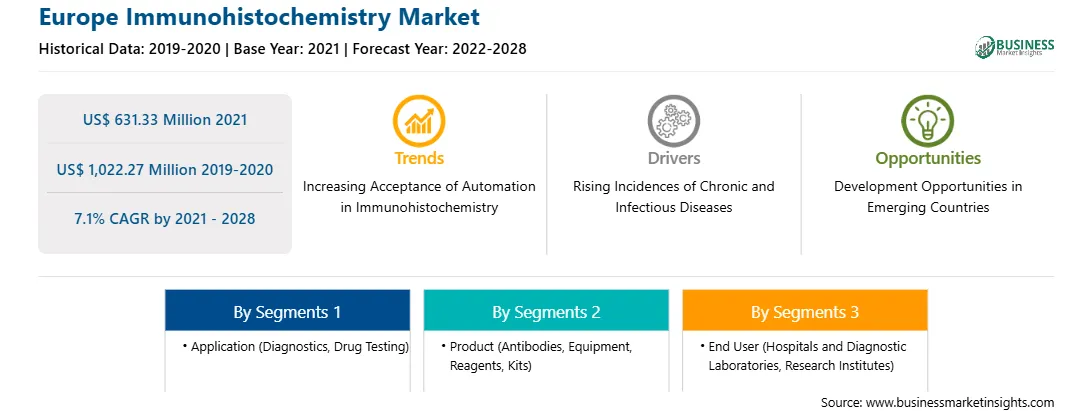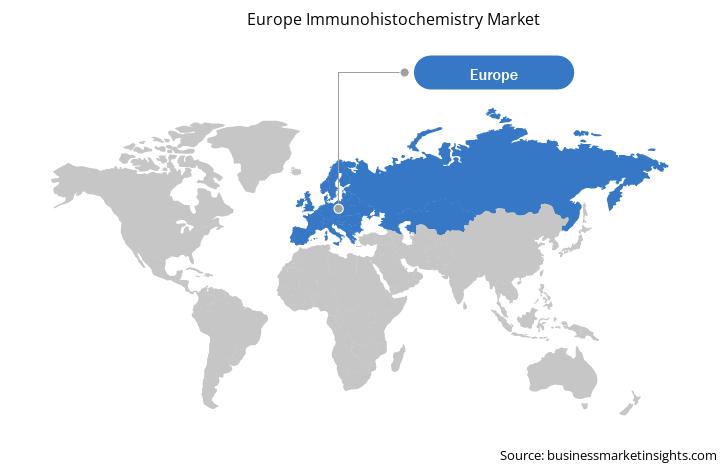Europe is the second-largest market for immunohistochemistry, and the UK, Germany, France, Italy, Spain, and Rest of Europe are the major contributors to this market in this region. The Germany led the market during forecast period. Germany has witnessed a tremendous increase in cancer cases in recent years; for instance, according to the Global Cancer Observatory, in 2020, a total 6,28,519 number of new cases in both sexes and all ages were found, along with cases of 69 697 (11.1%) breast cancer, 67 959 (10.8%) Prostate cancer, 64 804 (10.3%) Lung cancer, 57 528 (9.2%) Colorectum cancer, 35 147 (5.6%) Bladder cancer, and 333 384 (53%) Other cancers. Immunohistochemistry is widely used in the diagnosis and management of cancer; thus, the demand for immunohistochemistry is increasing in the country. The prevalence of cardiovascular diseases is rising in the country. The elderly population majorly contributes to the rise in the prevalence of cardiovascular diseases. Demographic changes are creating major challenges for patient care. The number of chronic illnesses is also steadily growing along with an increasingly aging population. At the same time, cost pressure in the healthcare sector is rising. As the Max Planck Institute 2019 states, approximately 30-40% of adults have high blood pressure in the country. The incidences increase with the growing age, and people above the age of 60 are more likely to develop CVD. IHC is becoming increasingly popular in the field of clinical diagnostics because it is used to diagnose chronic diseases such as cancer, infectious diseases, cardiovascular diseases, and autoimmune diseases. Therefore, the increasing prevalence of chronic diseases is expected to increase the demand for immunohistochemical solutions, thus promoting the market growth.
Countries in Europe, especially France, are highly affected due to the COVID-19 outbreak. Coronavirus immunohistochemistry antibodies are immunological methods that can be used to identify members of the Coronaviridae family of RNA viruses that infect birds and mammals. Antibodies against antigens expressed by several coronavirus strains, such as SARS-CoV-2, SARS-CoV, MERS, and other non-human pathogens like feline coronavirus, are listed below. Common coronavirus antibody targets include nucleocapsid (N) and spike glycoprotein (S). These antibodies are intended for immunohistochemical applications. Immunohistochemistry analysis shows the detection of differential expression levels of SARS-CoV-2 Coronavirus Nucleocapsid and demonstrates antibody specificity. Immunohistochemical analysis of SARS-CoV-2 Coronavirus NP using SARS/SARS-CoV-2 Coronavirus NP Monoclonal Antibody (B46F) (Cat. No. MA1-7404) shows significant staining in human lung and placenta tissues infected with SARS-CoV-2 when compared to the control tissues without SARS-CoV-2. Researchers from the UK and Sweden recently used extremely sensitive multiplexed immunohistochemistry to examine ACE2 expression in brain pericytes of patients with neurological symptoms in COVID-19 patients and controls. They also used spatial immunophenotyping to evaluate inflammation in COVID-19 patients' brain tissue.

Strategic insights for the Europe Immunohistochemistry provides data-driven analysis of the industry landscape, including current trends, key players, and regional nuances. These insights offer actionable recommendations, enabling readers to differentiate themselves from competitors by identifying untapped segments or developing unique value propositions. Leveraging data analytics, these insights help industry players anticipate the market shifts, whether investors, manufacturers, or other stakeholders. A future-oriented perspective is essential, helping stakeholders anticipate market shifts and position themselves for long-term success in this dynamic region. Ultimately, effective strategic insights empower readers to make informed decisions that drive profitability and achieve their business objectives within the market.

| Report Attribute | Details |
|---|---|
| Market size in 2021 | US$ 631.33 Million |
| Market Size by 2028 | US$ 1,022.27 Million |
| Global CAGR (2021 - 2028) | 7.1% |
| Historical Data | 2019-2020 |
| Forecast period | 2022-2028 |
| Segments Covered |
By Application
|
| Regions and Countries Covered | Europe
|
| Market leaders and key company profiles |
The geographic scope of the Europe Immunohistochemistry refers to the specific areas in which a business operates and competes. Understanding local distinctions, such as diverse consumer preferences (e.g., demand for specific plug types or battery backup durations), varying economic conditions, and regulatory environments, is crucial for tailoring strategies to specific markets. Businesses can expand their reach by identifying underserved areas or adapting their offerings to meet local demands. A clear market focus allows for more effective resource allocation, targeted marketing campaigns, and better positioning against local competitors, ultimately driving growth in those targeted areas.

The Europe immunohistochemistry market is expected to grow from US$ 631.33 million in 2021 to US$ 1,022.27 million by 2028; it is estimated to grow at a CAGR of 7.1% from 2021 to 2028. Traditional diagnostic tests were generally conducted in laboratories with expensive equipment and staffed with trained personnel accountable for performing the tests. Since the last few decades, diagnostic testing has gradually progressed out of the central laboratory and into testing sites, which is close to patients. The rising demand for immunohistochemistry, coupled with a shortage of working staffs in the immunology labs, has created a need for automation in immunohistochemistry. Automation in immunohistochemistry (IHC) provides the opportunity to improve sensitivity levels, reproducibility, standardization, as well as offers advantages such as a reduction in working time and saving of reagents. Analytical flexibility is one of the essential factors required in the immunohistochemistry protocols. Automation of the IHC contributes to standardize the immunohistochemical techniques decisively. Moreover, it also helps to simplify 16-step manual methods to 5-step methods that help to minimize the number of working personnel. Furthermore, the automated immunohistochemistry ensures consistent quality and discharge of stains and improves the standardization and optimization of the different techniques. Moreover, with reliable and fast results, automation can provide diagnostic test results at better speed, leading to shortening the period of hospitalization, resulting in cost-savings. Thus, various benefits offered by automation in immunohistochemistry (IHC) are likely to be accepted and act as one of the prevalent trends in the Europe market over the coming years.
In terms of product, the antibodies segment accounted for the largest share of the Europe immunohistochemistry market in 2020. In terms of application, the diagnostics segment held a larger market share of the Europe immunohistochemistry market in 2020. Further, the hospitals and diagnostic laboratories segment held a larger share of the Europe immunohistochemistry market based on end user in 2020.
A few major primary and secondary sources referred to for preparing this report on the Europe immunohistochemistry market are company websites, annual reports, financial reports, national government documents, and statistical database, among others. Major companies listed in the report are Abcam plc; Agilent Technologies, Inc.; Bio SB; BIO-RAD LABORATORIES INC.; Cell Signaling Technology, Inc.; Danaher; F. HOFFMANN-LA ROCHE LTD.; MERCK KGaA; PerkinElmer Inc.; and THERMO FISHER SCIENTIFIC INC.
The Europe Immunohistochemistry Market is valued at US$ 631.33 Million in 2021, it is projected to reach US$ 1,022.27 Million by 2028.
As per our report Europe Immunohistochemistry Market, the market size is valued at US$ 631.33 Million in 2021, projecting it to reach US$ 1,022.27 Million by 2028. This translates to a CAGR of approximately 7.1% during the forecast period.
The Europe Immunohistochemistry Market report typically cover these key segments-
The historic period, base year, and forecast period can vary slightly depending on the specific market research report. However, for the Europe Immunohistochemistry Market report:
The Europe Immunohistochemistry Market is populated by several key players, each contributing to its growth and innovation. Some of the major players include:
The Europe Immunohistochemistry Market report is valuable for diverse stakeholders, including:
Essentially, anyone involved in or considering involvement in the Europe Immunohistochemistry Market value chain can benefit from the information contained in a comprehensive market report.